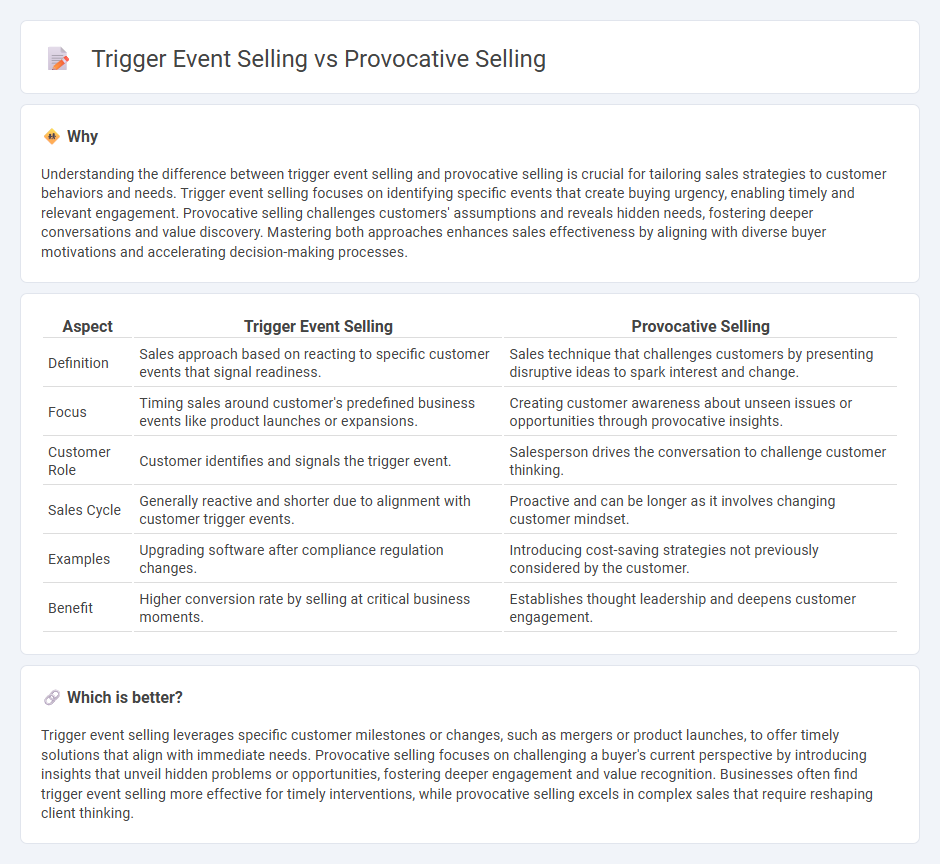
Trigger event selling leverages specific customer occurrences--such as mergers, product launches, or leadership changes--to offer timely solutions addressing immediate needs. Provocative selling challenges customers' assumptions by highlighting overlooked problems or opportunities, stimulating demand through insightful perspectives. Explore how each approach can strategically enhance your sales effectiveness.
Why it is important
Understanding the difference between trigger event selling and provocative selling is crucial for tailoring sales strategies to customer behaviors and needs. Trigger event selling focuses on identifying specific events that create buying urgency, enabling timely and relevant engagement. Provocative selling challenges customers' assumptions and reveals hidden needs, fostering deeper conversations and value discovery. Mastering both approaches enhances sales effectiveness by aligning with diverse buyer motivations and accelerating decision-making processes.
Comparison Table
| Aspect | Trigger Event Selling | Provocative Selling |
|---|---|---|
| Definition | Sales approach based on reacting to specific customer events that signal readiness. | Sales technique that challenges customers by presenting disruptive ideas to spark interest and change. |
| Focus | Timing sales around customer's predefined business events like product launches or expansions. | Creating customer awareness about unseen issues or opportunities through provocative insights. |
| Customer Role | Customer identifies and signals the trigger event. | Salesperson drives the conversation to challenge customer thinking. |
| Sales Cycle | Generally reactive and shorter due to alignment with customer trigger events. | Proactive and can be longer as it involves changing customer mindset. |
| Examples | Upgrading software after compliance regulation changes. | Introducing cost-saving strategies not previously considered by the customer. |
| Benefit | Higher conversion rate by selling at critical business moments. | Establishes thought leadership and deepens customer engagement. |
Which is better?
Trigger event selling leverages specific customer milestones or changes, such as mergers or product launches, to offer timely solutions that align with immediate needs. Provocative selling focuses on challenging a buyer's current perspective by introducing insights that unveil hidden problems or opportunities, fostering deeper engagement and value recognition. Businesses often find trigger event selling more effective for timely interventions, while provocative selling excels in complex sales that require reshaping client thinking.
Connection
Trigger event selling and provocative selling both focus on leveraging specific moments or insights to influence buyer behavior. Trigger event selling capitalizes on external changes like mergers or regulatory updates to prompt a sales conversation, while provocative selling challenges customers' current perspectives by introducing unexpected insights or problems, creating urgency. Both strategies aim to engage prospects more deeply by aligning sales efforts with timely, relevant stimuli that drive decision-making.
Key Terms
Provocative Selling:
Provocative Selling centers on challenging prospects' current thinking by highlighting overlooked problems and opportunities, creating a sense of urgency to change. This method relies on insight-driven conversations that reshape customer perspectives, often leading to higher engagement and faster decision-making. Discover more about how Provocative Selling can transform your sales strategy and drive growth.
Insight
Provocative selling leverages unique insights that challenge customers' current thinking and reveal unrecognized problems, driving urgency through value creation. Trigger event selling capitalizes on specific, timely events such as mergers, regulatory changes, or leadership shifts, using these moments as catalysts for engaging prospects. Discover how integrating insight-driven strategies can transform your sales approach and boost success rates.
Challenge
Provocative selling centers on identifying and challenging a prospect's assumptions to create urgency and highlight overlooked business challenges. Trigger event selling capitalizes on specific external occurrences--such as mergers, regulatory changes, or leadership shifts--that naturally prompt a buying decision by elevating the relevance of a solution. Explore the nuances of these sales strategies to effectively align your approach with customer timing and mindset.
Source and External Links
What is Provocative Selling? Examples & Techniques That Work - Provocative selling, or provocation-based selling, involves identifying urgent problems prospects don't realize they have and presenting solutions that connect to critical business outcomes to persuade and engage customers effectively.
What is Provocative Selling? | A Modern Powerful Selling Style - This selling style offers customers a unique perspective by revealing overlooked challenges and demonstrating value through evocative storytelling, case studies, and testimonials to create a memorable customer experience beyond price considerations.
The Provocative Sale - Electrical Wholesaling - Provocative selling focuses on finding hidden critical problems for customers, presenting them boldly and creatively to key decision-makers, and knowing when to exit gracefully if the prospect is unresponsive, emphasizing a high-impact single opportunity approach.
 dowidth.com
dowidth.com